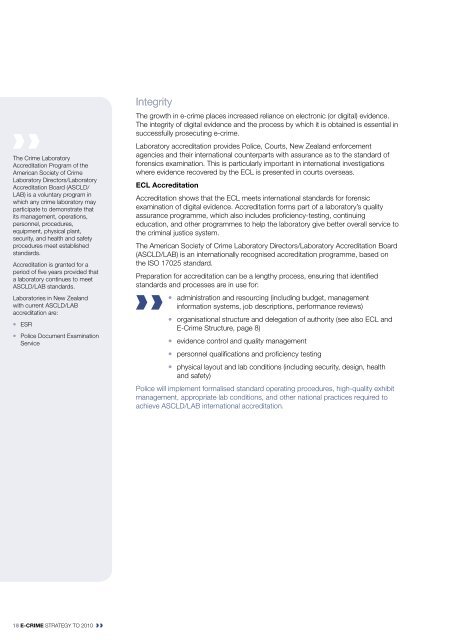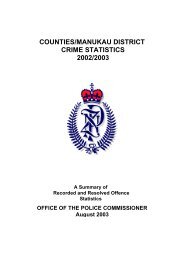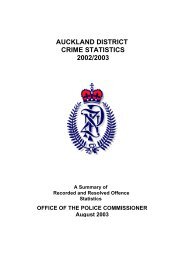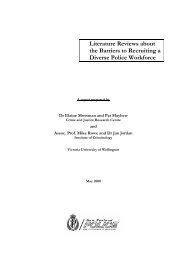Electronic Crime Strategy to 2010 - New Zealand Police
Electronic Crime Strategy to 2010 - New Zealand Police
Electronic Crime Strategy to 2010 - New Zealand Police
Create successful ePaper yourself
Turn your PDF publications into a flip-book with our unique Google optimized e-Paper software.
The <strong>Crime</strong> Labora<strong>to</strong>ry<br />
Accreditation Program of the<br />
American Society of <strong>Crime</strong><br />
Labora<strong>to</strong>ry Direc<strong>to</strong>rs/Labora<strong>to</strong>ry<br />
Accreditation Board (ASCLD/<br />
LAB) is a voluntary program in<br />
which any crime labora<strong>to</strong>ry may<br />
participate <strong>to</strong> demonstrate that<br />
its management, operations,<br />
personnel, procedures,<br />
equipment, physical plant,<br />
security, and health and safety<br />
procedures meet established<br />
standards.<br />
Accreditation is granted for a<br />
period of five years provided that<br />
a labora<strong>to</strong>ry continues <strong>to</strong> meet<br />
ASCLD/LAB standards.<br />
Labora<strong>to</strong>ries in <strong>New</strong> <strong>Zealand</strong><br />
with current ASCLD/LAB<br />
accreditation are:<br />
• ESR<br />
• <strong>Police</strong> Document Examination<br />
Service<br />
Integrity<br />
The growth in e-crime places increased reliance on electronic (or digital) evidence.<br />
The integrity of digital evidence and the process by which it is obtained is essential in<br />
successfully prosecuting e-crime.<br />
Labora<strong>to</strong>ry accreditation provides <strong>Police</strong>, Courts, <strong>New</strong> <strong>Zealand</strong> enforcement<br />
agencies and their international counterparts with assurance as <strong>to</strong> the standard of<br />
forensics examination. This is particularly important in international investigations<br />
where evidence recovered by the ECL is presented in courts overseas.<br />
ECL Accreditation<br />
Accreditation shows that the ECL meets international standards for forensic<br />
examination of digital evidence. Accreditation forms part of a labora<strong>to</strong>ry’s quality<br />
assurance programme, which also includes proficiency-testing, continuing<br />
education, and other programmes <strong>to</strong> help the labora<strong>to</strong>ry give better overall service <strong>to</strong><br />
the criminal justice system.<br />
The American Society of <strong>Crime</strong> Labora<strong>to</strong>ry Direc<strong>to</strong>rs/Labora<strong>to</strong>ry Accreditation Board<br />
(ASCLD/LAB) is an internationally recognised accreditation programme, based on<br />
the ISO 17025 standard.<br />
Preparation for accreditation can be a lengthy process, ensuring that identified<br />
standards and processes are in use for:<br />
• administration and resourcing (including budget, management<br />
information systems, job descriptions, performance reviews)<br />
• organisational structure and delegation of authority (see also ECL and<br />
E-<strong>Crime</strong> Structure, page 8)<br />
• evidence control and quality management<br />
• personnel qualifications and proficiency testing<br />
<strong>Strategy</strong> Review<br />
and Governance<br />
The governance of this e-crime strategy and the measures arising from it reach<br />
across many areas of policing. These include operational responses <strong>to</strong> e-crime<br />
prevention and investigation and the development of <strong>Police</strong> capabilities through<br />
training, research and resource development.<br />
E-crime also reaches across traditional crime areas and criminal groups as well<br />
as some having new features that have emerged with the growth of the electronic<br />
environment.<br />
The strategies in this document also affect a wide variety of <strong>Police</strong> staff and<br />
domestic and international partner agencies.<br />
Because of the diversity of measures required <strong>to</strong> address e-crime, it is appropriate<br />
that the Commissioners govern this strategy. Key roles include:<br />
• Executive Sponsor: Deputy Commissioner, Operations<br />
• Business Owner: National Manager, <strong>Crime</strong> Services<br />
• Performance Management and Review: Assistant Commissioner,<br />
<strong>Strategy</strong>, Policy, and Performance<br />
The key elements of governance include:<br />
• an annual progress report <strong>to</strong> the <strong>Police</strong> Executive of the strategy and its<br />
impact<br />
• incorporation of actions in<strong>to</strong> the performance management framework<br />
Implementation of the E-<strong>Crime</strong><br />
<strong>Strategy</strong> <strong>to</strong> <strong>2010</strong> involves several<br />
key initiatives.<br />
Additional capability will need<br />
<strong>to</strong> be acquired or reallocated by<br />
<strong>Police</strong>, <strong>to</strong> fund the key initiatives<br />
and the ongoing development<br />
and participation in key<br />
partnerships and forums.<br />
The next steps in progressing<br />
the E-<strong>Crime</strong> <strong>Strategy</strong> include:<br />
• prioritise initiatives and assign<br />
ownership<br />
• agree a programme of work<br />
and associated resourcing<br />
requirements<br />
• incorporate initiatives in<strong>to</strong><br />
annual business plans /<br />
prepare business cases as<br />
required<br />
• physical layout and lab conditions (including security, design, health<br />
and safety)<br />
<strong>Police</strong> will implement formalised standard operating procedures, high-quality exhibit<br />
management, appropriate lab conditions, and other national practices required <strong>to</strong><br />
achieve ASCLD/LAB international accreditation.<br />
• a review of the strategy <strong>to</strong> be completed by 30 September 2009<br />
Risks and issues associated with this strategy will be identified as part of the<br />
business unit planning process and in consultation with the Risk Advisor and the<br />
Organisational Performance Group. The planning will cover strategic and operational<br />
risks in relation <strong>to</strong> services, capability, and change.<br />
16 E-CRIME STRATEGY TO <strong>2010</strong> E-CRIME STRATEGY TO <strong>2010</strong> 17
















